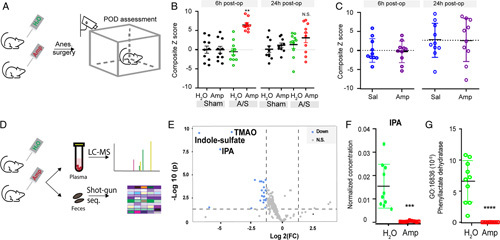FIGURE 2.

Gut microbiota perturbation exacerbates POD-like behavior. (A, B) Gut microbiota perturbation with oral ampicillin worsened POD-like behavior. (A) Flowchart of mice gut microbiota perturbation followed by anesthesia-surgery (A/S) and POD behavioral testing. (B) Behavior composite Z score at 6- and 24-hour postoperatively. For each time point, comparison of the groups was carried out using 1-way ANOVA, post-hoc LSD test was performed where appropriate. **P<0.01 “H2O, A/S” versus “Amp, A/S.” N.S., P>0.05 with 1-way ANOVA. (C) Intrathecal administration of ampicillin does not significantly alter POD-like behavior. Mice received daily intrathecal administration of saline (Sal) or Ampicillin (Amp) for 2 weeks followed by anesthesia and surgery (N=10 per group). POD-like behaviors were assessed to compute Z scores. N.S., P>0.05, t test. (D–G). Oral ampicillin treatment perturbates gut microbiota and its metabolites. (D) Flowchart for metabolomics and fecal shot-gun sequencing for mice received oral ampicillin treatment. (E) Volcano plot of metabolites that were significantly different between mice received ampicillin versus those received regular water. Cutoff thresholds were the same as in human study. Blue color represents metabolites that were significant decreased after ampicillin treatment, with the top 3 metabolites specified. N=10 each group. (F) IPA level. ***P<0.001 when adjusted for repetitive measurements (t test). (G) An IPA-related GO term, 16836, was decreased by gut microbiota perturbation using oral ampicillin. Transcripts number for GO term 16836 from each animal in both groups were plotted and compared. ****P<0.0001, t test. ANOVA indicates analysis of variance; GO, gene ontology; IPA, indole-3-propionic acid; LSD, Fisher’s least significant difference; POD, postoperative delirium.
